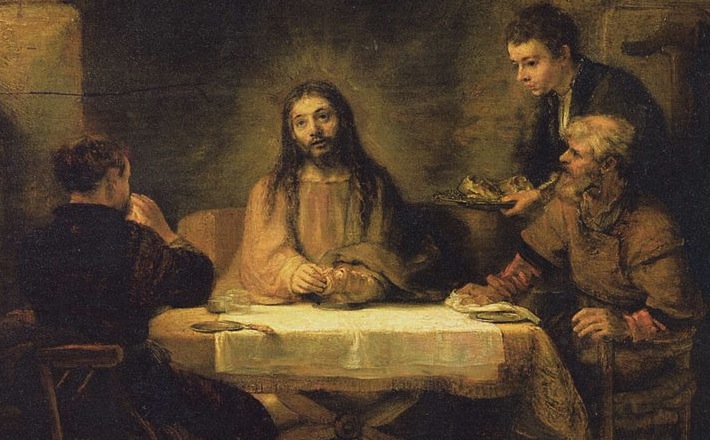Commentary on Acts 2:14a, 36-41
Luke has kept us waiting so long for the fulfillment of this plot point that we may have forgotten we were waiting for it at all.
So, let’s start by backing up and rediscovering the seed that was planted so long ago.
It all started in Luke 3. John the Baptist, whose miraculous birth we’ve heard all about, has burst onto the scene as a full-grown adult with curious habits of attire and nutrition. He does not pull any of his punches. He has a lot to say about repentance — and a lot to say to those who don’t repent. But for those who do, he has something to offer: baptism.
Baptism is so exceedingly familiar to Christians that we rarely catch how unutterably bizarre and novel John’s baptism was. Of course, there were plenty of ablutions and immersions in the religious practice of Israel. Using water for cleansings both physical and symbolic is hardly an innovative idea. But in Israel, all these immersions were performed solo, by and on one’s own self. No one else immersed you.
As far as we know, John was the first one to come along and immerse others. Getting a dunking by John in the Jordan was public testimony to one’s repentance, aligning oneself with repentant Israel. It was odd enough to attract crowds of people to the wilderness, including tax collectors and soldiers.
Compelling as it is, John’s baptism centered on repentance is limited in its scope. It’s not clear whether Luke thinks John’s baptism could also forgive the sins of the repentant; the Evangelist seems to be trying to distance himself from that inference inherited from Mark. But there is an even more important curtailment of John’s power that Mark, Luke, and all the rest agree on: John cannot baptize with the Holy Spirit. Instead, one is coming, John prophesies, who will indeed baptize with the Holy Spirit and fire. And that one is so far above John that John isn’t even worthy to untie his sandals.
The proof: Jesus himself is the first to have the Spirit descend upon him at baptism. John’s Gospel records John the Baptist’s astonishment at the sight, and Matthew’s Gospel reports a kind of quarrel the two men had over whether the one should receive baptism from the other, which is followed by the startling descent of the Spirit. Luke actually detaches John the Baptist from Jesus’ baptism altogether, by interpolating the account of his beheading and keeping the act of baptism in the passive voice. One way or another, Luke wants to make it very clear that John’s baptism can’t bestow the Spirit.
Then twenty-one more chapters of Luke’s Gospel ensue, with a lot of exciting and distracting things like miracles, exorcisms, a crucifixion and a resurrection, so we may easily lose track of baptism and the Spirit along the way.
Fortunately, Peter, filled with the long-promised Holy Spirit, is here to make amends. All righteousness has been fulfilled: the Holy One of Israel was killed, but his faithful Father raised him up again to new life and through him grants the Holy Spirit. So, all those who are still carrying burdens of repentance can come to the promised deliverance. Come and be baptized, and two extraordinary promises will be fulfilled: in the name of Jesus Christ your sins will be forgiven, and you will receive the Holy Spirit. This is baptism 2.0, new and improved and better than ever!
The long list of the gathered nations on the day of Pentecost often obscures the fact that the people gathered to hear Peter’s sermon are all Jews — diaspora Jews, in the main. They’re back in Jerusalem for the festival, but they’ve so acclimated themselves to their new homelands (after the example of Esther or the instructions of Jeremiah) that they’ve forgotten the mother tongue, which is why the Spirit has to effect a linguistic miracle before Peter can be heard. But repatriation is not a problem. This gift of baptism with forgiveness and the Spirit is for them, for their children, and for all those however faraway they may be. In fact, the gift is for anyone the Lord calls to Himself: that’s the only prerequisite.
The rest of Acts is the Lord’s calling more and more people to receive His gift: first Samaritans, then a Jewish proselyte in the form of the Ethiopian eunuch, next Gentiles starting with Cornelius, and finally John’s disciples still stuck at baptism 1.0. But in the end the Lord claims them all, every community if not yet every individual member thereof. Sins will be forgiven and the Spirit will be poured out on all flesh.


April 30, 2017